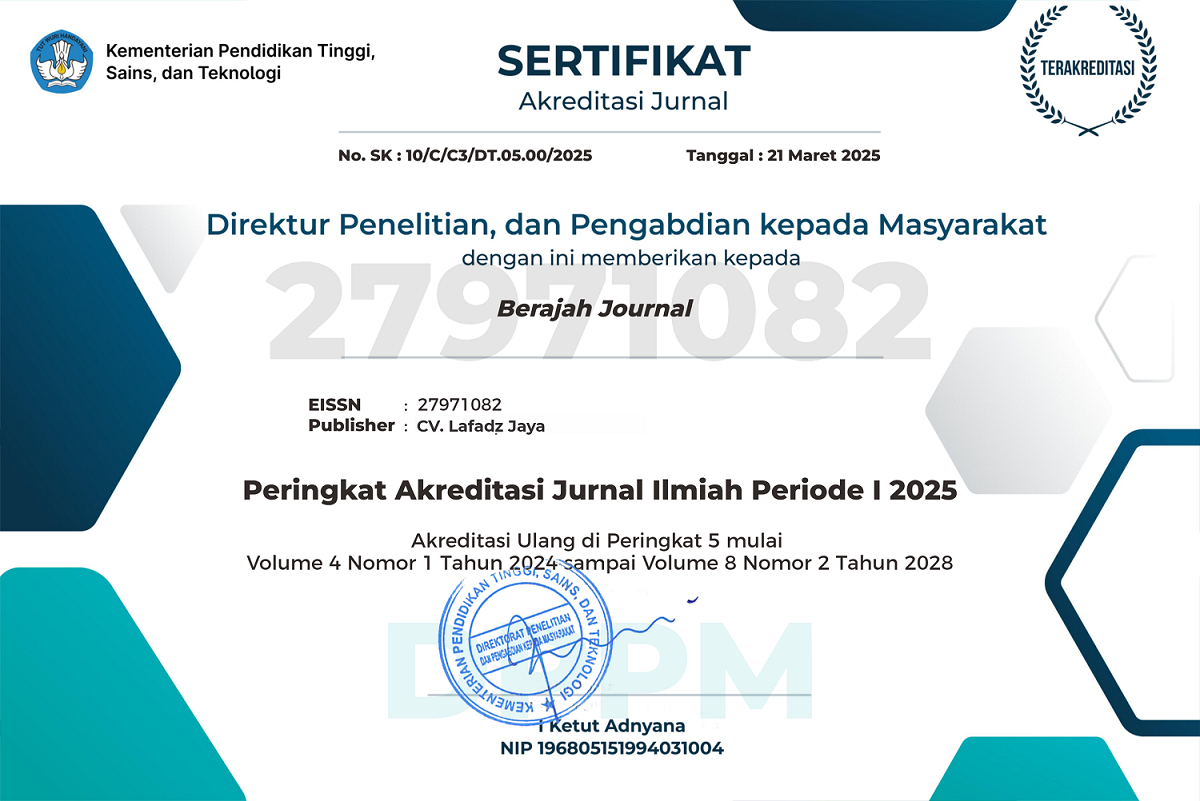KETIKA HIDUP DAN PEKERJAAN BERIRISAN: REFLEKSI KUALITATIF ATAS STRES KERJA SEBAGAI MEDIATOR DALAM PENINGKATAN KINERJA KARYAWAN
DOI:
https://doi.org/10.47353/bj.v5i3.613Keywords:
Work-Life Balance, Job Stress, Employee Performance and Qualitative ReflectionAbstract
This study aims to illustrate how work stress mediates the intersection of personal and work life and employee performance. This intersection phenomenon is increasingly relevant in the modern, flexible yet demanding work environment, where the boundaries between domestic and professional life are often blurred. This study used a qualitative approach using in-depth interviews with employees from various work sectors. The findings indicate that deadline pressure, home-work role conflict, family disruptions during work, lack of rest time, and minimal supervisor support are the main factors triggering work stress. Although work stress is often associated negatively, the results of this study indicate that in some cases, stress can actually motivate employees to perform optimally, making it a complex mediating factor. Perceptions of stress vary depending on individual coping capacity and the supportive work environment. Coping strategies used include time management, social support, separation of work-personal space, and relaxation activities. This study concludes that work stress is not always a barrier but can be a bridge to improved performance when managed appropriately. These findings have important implications for company policies, HR management, and the development of an adaptive and healthy work culture.
Downloads
References
Allen, T. D., French, K. A., Dumani, S., & Shockley, K. M. (2020). Meta-analysis of work–family conflict mean differences: Does national context matter? Journal of Vocational Behavior, 117, 103316. https://doi.org/10.1016/j.jvb.2019.10331
Castleberry, A., & Nolen, A. (2018). Thematic analysis of qualitative research data: Is it as easy as it sounds? Currents in Pharmacy Teaching and Learning, 10(6), 807–815. https://doi.org/10.1016/j.cptl.2018.03.019
Greenhaus, J. H., & Allen, T. D. (2011). Work–family balance: A review and extension of the literature. Journal of Management, 37(1), 17–50. https://doi.org/10.1177/0149206310382453
Guest, D. E. (2018). Perspective on the study of work-life balance. Social Science Information, 57(2), 189–197.
Haar, J. M., Russo, M., Suñe, A., & Ollier-Malaterre, A. (2019). Outcomes of work–life balance on job satisfaction, life satisfaction and mental health: A study across seven cultures. Journal of Vocational Behavior, 110, 244–257. https://doi.org/10.1016/j.jvb.2018.11.008
Maulana, R., & Hakim, A. (2022). Work-Life Balance, Job Stress and Employee Performance: A Case Study of Manufacturing Workers. Jurnal Ilmiah Manajemen, 10(1), 45–52.
Munir, F., Nielsen, K., Garde, A. H., Albertsen, K., & Carneiro, I. G. (2012). Mediating the effects of work–life conflict between transformational leadership and employee psychological well-being. Journal of Health Psychology, 17(3), 394–403. https://doi.org/10.1177/1359105311425725
Nada Nisrina, T. ., Ponco Dewi Karyaningsih, R. ., & Suherdi, S. (2023). Pengaruh Praktik Kerja Industri Dan Efikasi Diri Terhadap Kesiapan Kerja Siswa. Berajah Journal, 3(1), 75–86. https://doi.org/10.47353/bj.v3i1.198
Neale, J. (2019). Iterative categorization as a method for analysing qualitative data for applied policy research. Social Research Update, 76, 1–17.
Putra, Y. D., & Lestari, A. (2021). The effect of work-life balance on job satisfaction with stress as a mediating variable. Jurnal Manajemen dan Bisnis, 18(2), 135–144.
Robbins, S. P., & Judge, T. A. (2019). Organizational Behavior (18th ed.). Pearson.
Snyder, H. (2019). Literature review as a research methodology: An overview and guidelines. Journal of Business Research, 104, 333–339. https://doi.org/10.1016/j.jbusres.2019.07.039
Sutanto, E. M., & Kurniawan, Y. (2020). Pengaruh Lingkungan Kerja terhadap Kinerja Karyawan: Studi pada Industri Manufaktur. Jurnal Ekonomi dan Manajemen, 12(1), 25–34.
Sutarto, A. P. (2020). Hubungan antara jam kerja dan burnout pada pekerja industri manufaktur di Jawa Timur. Jurnal Psikologi Industri dan Organisasi, 5(2), 87–98
Taris, T. W., Schreurs, P. J. G., & Schaufeli, W. B. (2004). Construct validity of the Maslach Burnout Inventory-General Survey: A two-sample examination of its factor structure and correlates. Work & Stress, 13(3), 223–237.
Tranfield, D., Denyer, D., & Smart, P. (2003). Towards a methodology for developing evidence‐informed management knowledge by means of systematic review. British Journal of Management, 14(3), 207–222.
Wirawan, H. (2021). Manajemen Sumber Daya Manusia Indonesia: Teori, Psikologi, Organisasi dan Strategi. Jakarta: RajaGrafindo Persada.
Zainal, H., Azizah, N., & Ramdhani, A. (2020). The effect of work stress on employee performance in Indonesian manufacturing companies. Jurnal Psikologi Industri, 5(2), 75–84.
Downloads
Published
How to Cite
Issue
Section
License
Copyright (c) 2025 Harum Nauli, Pandapotan Sitompul, Miska Irani Br Tarigan, Ruben Simangunsong, Irma Suriyani Sinaga

This work is licensed under a Creative Commons Attribution 4.0 International License.






















